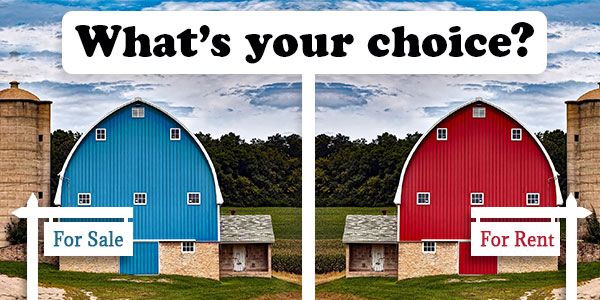Renting or buying - Which is the best option for you?

If you’re about to retire, it’s quite natural that you might want to move to a more comfortable place than your existing home, after retirement. In that case, you won’t be thinking about renting and simply ignore the benefits of renting. Rather you might want to buy a simple, sweet apartment where you can live peacefully. But, think again! Renting might be a much sweeter and cheaper financial move that will suit your lifestyle.
As per the study conducted by Harvard's Joint Center for Housing Studies on households with residents aged at least 65 years, 8 in 10 of them are homeowners. But still, when it comes to flexibility such as the ability to downsize, relocating to near your family, or just to lower the cost of living in another state, it becomes much harder.
Not everyone can maintain homeownership. People who want flexibility, financial freedom, and housing benefits, can opt for renting. You might realize that renting is much safer, cheaper, and more flexible choice compared to home buying.
How? Let’s find out.
a) No down payment
Being a renter you can save a lot from the upfront cost, compared to homeowners. It is always a better financial deal where you don’t have to bear a lump sum upfront cost. However, renters might have to pay a decent amount to the landlord as a security deposit, probably equal to their one month's rent. But, that deposit amount is way lower than the down payment you usually have to pay while purchasing a home with a mortgage. Typically, the amount will be 20% of your total property value, and it’s kind of a huge amount to bear, isn't it?
b) No maintenance costs or repair bills
Renters do not have to think about any maintenance costs or repair bills. Being a renter, you may request the landlord if there is any repair needed. Yes, your landlord is solely responsible for all maintenance, improvement, and repairs. But make sure you didn’t make any damage to the house, unless you may have to pay for the repairs.
But if you own a house, you will be responsible for all home repairs, maintenance, and renovation costs. Considering the type of repair, it can get quite costly.
c) Lower insurance costs
Homeowners should maintain a homeowner's insurance policy for their safety. Similarly, renters also have the equivalent coverage through a renter's insurance policy.
Renter's insurance policy is much cheaper than the homeowners' policy and the former covers almost everything, including furniture, electricals, and other valuable assets.
The average cost of renter's insurance is typically around $12-to-$20 per month. On the other hand, the average homeowner's insurance policy may cost you between $25-to-$80 per month.
d) Zero effect on decreasing property values
Property values may go up and down depending on various factors. This may affect homeowners quite a lot, but it merely affects renters.
When your home value increases, it can impact the amount of property taxes you pay as a homeowner. But it doesn’t affect renters as many homeowners.
The renters might experience a cumulative hike in the rent amount.
e) Renting is cheaper than buying
An October 2014 study by Trulia explained that being a homeowner is quite cheaper in the long term compared to renting a home in many states. The calculations were done considering the factors that the down payment is 20% and the homeowner would be living in the property for long 7 years.
However, the young generation doesn't like to stay that much time in a house, probably 5 years max. They typically rely on the Federal Housing Administration (FHA) insured loans. They would also ignore itemizing their tax deductions. So, for them renting is cheaper than buying.
AS per a study by Trulia, in 27 out of 100 largest metropolitan cities, (such as Sacramento, Baltimore, Detroit, Chicago, Raleigh, North Carolina, Philadelphia, Providence, Rhode Island, Oklahoma City, Boston, etc.), renting is cheaper than buying.
f) Zero mortgage debt
Mortgage debt is good debt that increases your asset value. However, if you do not like to carry a huge debt burden on your shoulder, then buying a home isn’t for you.
“According to the Federal Reserve, the amount of outstanding mortgage debt in the U.S. is around $13.4 billion”.
So, technically most homeowners opt for a traditional 30-year mortgage to ease up the payment process. If you do not wish to carry that out, renting is your best choice.
g) No real estate taxes
One of the major benefits of renting is, being a renter you don’t have to think about paying property taxes. Real estate taxes are a big headache for homeowners and the amount may vary by county. The costs can be thousands of dollars per annum.
h) Flexibility for living
Renters can live anywhere they want to. But homeowners are restricted to buy properties in specific areas. A home in the most expensive part of a city might be unavailable for most home buyers, but it might be accessible for renters. Rents can be high in those areas due to high property values.
i) Flexibility to downsize
By renting, people can downgrade into a more affordable home than an expensive house. It’s quite awful to carry a debt load that you can not lift in the first place. You may like an expensive home, and wish to buy it. But hello!!! Can you afford the monthly mortgage payments? I guess not.
Flexibility to downsize is especially important for people who are retired or about to retire. They need a cheaper, smaller alternative that matches their budget. When you are owning an expensive home, it'll be difficult to downgrade the cost. It is because the fees involved with the buying and selling process will be relatively high.
But while renting, you don’t have such obligations and you are free to downgrade as many times you want.
